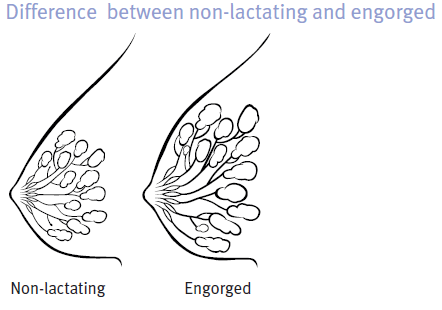Engorgement
After your baby is born, your breasts start producing colostrum, a fluid filled with nutrients and antibodies that protect your newborn from infections. Two to five days later, you breasts start producing milk and they may start feeling heavy, swollen and warm. This is called engorgement – a normal occurrence that can last anywhere from a couple of days to several weeks. If the increased amount of breast milk is not expressed, whether by nursing or through a breast pump, the breasts may become painful and hard, causing discomfort for mother, but also making feeding harder for the baby.
Engorgement usually happens within the first few days after delivery, but it can also happen once the breastfeeding routine is established and you need to skip a session for any reason: if nursing suddenly stops or if your baby starts breastfeeding significantly less than usual. The most common culprit is poor latching on – in this situation, your baby is not able to nurse properly, so your breasts can become over-filled with milk.
Hard nipples may make it harder for your baby to latch on, so your little one may try sucking harder, which can further result in cracked and sore nipples. Some mums may decide to skip a nursing session or two, trying to give their nipples a chance to recover, but this only leads to an even worse case of engorgement. Prolonged engorgement can lead to a decreased production of milk or it can develop into an infection called mastitis.
How to recognize engorgement
Typical symptoms include:
- Firm, swollen and painful breasts, that are often red, warm to the touch and may feel lumpy
- Firm flattened nipples
- Swelling or tenderness around the armpits
- Slight fever or flu-like symptoms (if this is the case, do visit a doctor)
Prevention
Ideally, you would be able to breastfeed your baby within the first couple of hours after delivery. Nurse every 1 to 3 hours, or whenever you notice the first signs of hunger – your newborn may become restless, start rooting or mouthing. Talk to a lactation consultant to make sure that your baby is latching on properly – this can make a world of difference and protect you from issues such as engorgement or painful nipples. If you need to miss a feeding session, express the milk (you can store it in the freezer and use when you’re away for work or travelling). While nursing, try to empty the breast completely before offering the other one. Start a new feeding session with the breast you ended the previous session with. Once the weaning time comes, go through the process gradually – a sudden stop in breastfeeding can leave your breasts full of milk, leading to engorgement and mastitis.
Treatment
If your breasts are engorged, try to breastfeed as often as possible. A warm compress prior to nursing can soften the breasts and allow more milk to be expressed. Paracetamol can help with pain and the swelling. If your breasts still feel painful and swollen after nursing, try applying a cold compress. You could use a wet towel, or a breast compress that contains soothing ingredients which will simultaneously nurture the gentle skin around the nipples and prevent cracking. Also, a gentle massage of the breast prior to and during nursing can help with the milk flow. Your baby could have problems with latching on because of shortened nipples. If so, express a little milk first to make it easier.
If you are not breastfeeding, try expressing some milk by hand or use a breast pump. A well-fitted nursing bra that offers sufficient support can also provide some relief.
In case none of these methods work and your breasts are still engorged, consult your physician for further advice.


